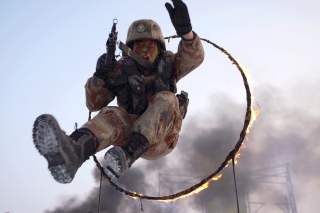Forget Aircraft Carriers or Stealth: Here Come China's Special Forces
Special forces are becoming more heavily relied on by modern militaries.
Key point: Special forces have become America's instrument for waging small wars on the cheap, using small numbers of elite soldiers rather than large numbers of expensive -- and politically sensitive -- regular troops.
Some special force units get all the attention. America’s Delta Force, Russia's Spetnatz and Britain's SAS have glamorous reputations.
When was the last time you heard about China's commandos?
But Chinese special forces exist, and they have been growing in size, sophistication and global reach, according to the U.S. Army's Foreign Military Studies Office (FMSO). Their command structure has been streamlined and training has become more realistic.
China put these changes to this summer during the first comprehensive assessment of its special forces. The exercise, Ingenious Special Operations Soldier-2018, "tested all levels of command, including brigade, battalion, company, element and squad levels," FMSO said. "While media coverage of the exercise emphasized tests of special forces skills, such as fast-roping from helicopters, night operations and sniper attacks, the underlying point of the exercise is likely to be the test of command capabilities."
Chinese special operations units are a recent creation. "China’s first army special forces units were first set up in the 1990s," FMSO said in the August issue of its OE Watch magazine. "Additional units have continued to be stood up, with the other services of the PLA establishing SOF [special operations forces] units with specialized skills sets throughout the 2000s."
Each People's Liberation Army Group Army has an attached special forces regiment or brigade. "Increasing realism in training, and particularly the creation of PLA Aviation Brigades that provide SOF brigades with organic vertical lift, are important steps in creating an operationally useful force," FMSO noted. "As assessments of the exercise “Ingenious Special Operations Soldier-2018” are published or future iterations of the exercise take place, the PLA’s progress in implementing the new command structure should become more clear."
As for naval commandos, in 2002 the People's Liberation Army Navy created the Jiaolong (“Water Dragon”). In 2015, it evacuated foreign nationals from the Yemen conflict, and in 2017 it recaptured a hijacked freighter from Somali pirates in the Gulf of Aden as part of China's anti-piracy patrols in the region. "Although the unit has provided ample fodder for Chinese Navy recruitment videos and propaganda, it should not detract from the fact that naval special forces have important roles to play in how China could conduct wars across a range of theaters," said FMSO. "Video of Jiaolong unit training show them operating in a wide range of environments, from desert to frozen mountains and conducing airborne, surface and underwater infiltration missions."
A Water Dragon company commander told Chinese media that the washout rate for the unit is 88.8 percent.
Of course, just like in the U.S., where every service feels compelled to have its own special operations unit, China's air force has a commando brigade. In 2011, the People's Liberation Army Air Force created the "Thunder Gods" unit.
"The Leishen unit, as elite parachutists, have acted as a test bed for innovations in the airborne corps," FMSO said. "They train jumping from different aircraft and using various parachute configurations and maneuvers. Members of Leishen have attended Venezuela’s Hunter School to learn jungle warfare and participated in several international special forces competitions."
Special forces are only as good as their transportation, and China is developing the capability to convey special forces to where they are needed. "China has traditionally lacked the transport aircraft needed to perform a major airborne operation," FMSO notes. "With the Y-20 heavy lift transport entering mass production and upgrades to smaller aircraft being rolled out, that situation is changing. Although still in its early stages, PLAAF special forces units like the Leishen commandos have laid an important foundation for building a strong strategic deterrent and power projection capability."
Recommended: What Will the Sixth-Generation Jet Fighter Look Like?
Recommended: Imagine a U.S. Air Force That Never Built the B-52 Bomber
Recommended: Russia's Next Big Military Sale - To Mexico?
Recommended: Would China Really Invade Taiwan?
Which brings up the real question: Do improvements in China's special forces mean they will be used more often? Would America's current foreign policy even be possible without special operations units to battle insurgents or train friendly troops in the Middle East and Africa?
Special forces have become America's instrument for waging small wars on the cheap, using small numbers of elite soldiers rather than large numbers of expensive -- and politically sensitive -- regular troops.
As China begins to stretch its muscles across the globe, it would be surprising if it did not do the same.
Michael Peck is a contributing writer for the National Interest. He can be found on Twitter and Facebook. This article first appeared in 2018.
Image: Reuters.

